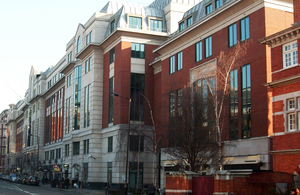Improving Britain's airports
Improvements to put passengers at the heart of how airports are run, encourage competition and promote investment.

Proposals designed to improve Britain’s major airports were unveiled by Transport Secretary, Philip Hammond, today (21 July 2010).
The package of measures is designed to put passengers at the heart of how airports are run, encourage competition between airports and promote investment which will make Britain’s major airports better, not bigger.
Under the plans - which will reform the framework for regulating airports - the aviation regulator, the Civil Aviation Authority (CAA), will be given a new primary duty to promote the interests of passengers. The CAA will also be given a supplementary financing duty - helping to drive passenger focused investment. It will also be granted new and more effective powers to take action against airports that underperform and new powers to investigate and take action against anti-competitive behaviour.
The proposals would also see a switch to a new regulatory licensing regime. This will allow regulation to be tailored to meet the requirements of individual airports, rather than the same conditions being applied to all regulated airports. This will enable the CAA to better target regulatory activity where and when it is needed to protect the interests of consumers.
Philip Hammond said:
The way our airports are regulated is in urgent need of reform. The current economic regulation legislation dates from 1986, when the aviation sector looked very different from today.
We must now put passengers at the heart of how our airports are run. We have already announced that we do not support the building of new runways at Heathrow, Gatwick or Stansted. We want to make those airports better, not bigger and that is exactly what these measures will do.
These changes will help drive passenger-focused investment in airports - such as in new baggage handling equipment or building new modern facilities - and they will also allow economic regulation to be used in a more targeted way and remove unnecessary bureaucracy.
After careful consideration, the government has decided not to give a new remit to Passenger Focus to represent air passengers as had previously been proposed. The government believes that it is important to have strong passenger representation but that this is not the time to be make additional structural changes which will add to the regulatory burden on industry. It will therefore be exploring options for strengthening existing passenger representation arrangements.
The government announced in the Queen’s Speech its intention to reform the framework for the economic regulation of airports. The government plans to bring forward legislation to implement these reforms as soon as Parliamentary time allows.
Further information
The CAA currently has four duties for the purposes of economic regulation, they are:
- to further the reasonable interests of users of airports within the UK, users being defined (in section 82 of the Airports Act) as airlines, passengers and other user of air transport services at the airport
- to promote the efficient, economic and profitable operation of such airports
- to encourage investment in new facilities at airports in time to satisfy anticipated demands by the users of such airports
- to impose the minimum restrictions that are consistent with the performance by the CAA of its functions under those sections
In addition, the CAA also is also required to take account of international obligations.
These duties will be replaced with a single primary duty and a number of supplementary duties. These will be set out in full in future legislation.
Licensing: The proposals see a new licensing regime to be applicable only to airports with substantial market power and where such regulation adds real value. This is presently expected to apply initially to Heathrow, Gatwick and Stansted. The current regulatory regime is set out in statute with limited powers for the CAA to address changes in market conditions over time and take account of the requirements of individual airport.
Competition Powers: The proposals will provide the CAA, in line with other regulators, concurrent powers with the Office of Fair Trading giving the option, where appropriate, to respond to anti-competitive behaviour using competition law powers rather than by applying regulatory tools. This will enable the CAA to investigate and remedy anti-competitive behaviour in the provision of airport services at airports, and where appropriate refer markets to the Competition Commission for investigation.
The government will not be making changes to the basis on which the current price caps at Heathrow, Gatwick and Stansted are set.
Aviation, maritime and technology media enquiries
Media enquiries 0300 7777 878
Switchboard 0300 330 3000